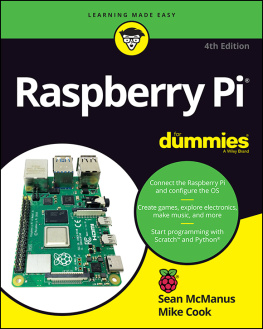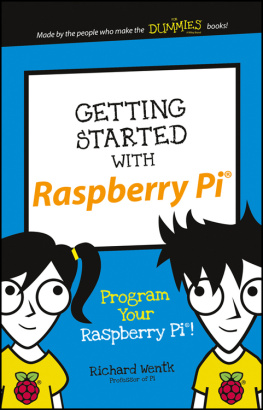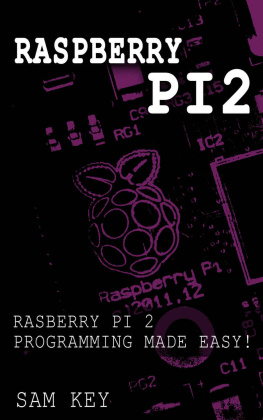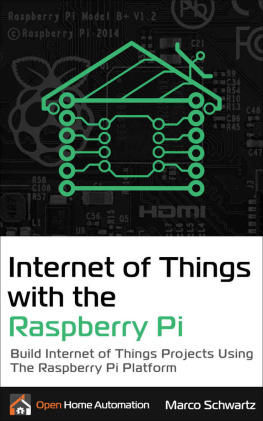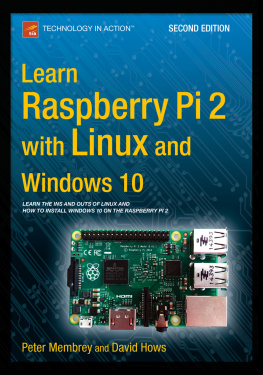About the Author
Stefan Sjogelid grew up in 1980s Sweden, getting hooked on 8-bit consoles, Amigas and BBSes. With a background in system and network administration, he packed his bags for Southeast Asia and continued to work in IT for many years, before love and a magic 8-ball told him to seek new opportunities in the North American continent.
The Raspberry Pi is the latest gadget to grab Stefan's attention, and after much tinkering and learning a great deal about the unique properties of the Pi, he launched the "PiLFS" (http://www.intestinate.com/pilfs) website, which teaches readers how to build their own GNU/Linux distribution and applications that are particularly useful on the Raspberry Pi.
I'd like to thank Anton for putting up with my "alt-tabbing" during our movie marathons, and a special thanks to my brother for showing me Southeast Asia, and my parents, for buying me a PC instead of a moped.
About the Reviewers
Valry Seys is a project engineer and a brilliant, self-taught man, having started his computer studies in the early 80s. He has come a long way, from working with the cheap Sinclair ZX81, to IBM Mainframe, and Unix. He is driven by a philosophy expressed by Stephen Wolfram:
"We are in the exciting stage that everyone, whether a scientist or not, can contribute"(Santa Fe Institute, 1984).
He currently works as an independent consultant for major French companies working in the sectors of telecom, banking, press publishing, insurance, defense, and administration.
My thanks go to Stefan, for including me in this book, and the scientist pioneers Stephen Wolfram and Karl Sims.
Masumi Mutsuda Zapater is a graduate of the Computer Science Engineering program from the UPC BarcelonaTech University. He combines his artistic job as a voice actor with his technological job at Itnig, an Internet startup accelerator. He is also a partner of Camaloon, an Itnig accelerated startup, globally providing both custom-designed and original products.
www.PacktPub.com
Support files, eBooks, discount offers and more
You might want to visit www.PacktPub.com for support files and downloads related to your book.
Did you know that Packt offers eBook versions of every book published, with PDF and ePub files available? You can upgrade to the eBook version at > for more details.
At www.PacktPub.com, you can also read a collection of free technical articles, sign up for a range of free newsletters and receive exclusive discounts and offers on Packt books and eBooks.
http://PacktLib.PacktPub.com
Do you need instant solutions to your IT questions? PacktLib is Packt's online digital book library. Here, you can access, read and search across Packt's entire library of books.
Why Subscribe?
- Fully searchable across every book published by Packt
- Copy and paste, print and bookmark content
- On demand and accessible via web browser
Free Access for Packt account holders
If you have an account with Packt at www.PacktPub.com, you can use this to access PacktLib today and view nine entirely free books. Simply use your login credentials for immediate access.
For Bradley Manninga real human being and a real hero ( www.bradleymanning.com) .
Preface
The Raspberry Pi was developed with the intention of promoting basic computer science in schools, but the Pi also represents a welcome return to simple, fun, and open computing.
Using gadgets for purposes other than those intended, especially for mischief and pranks, has always been an important part of adopting a new technology and making it your own.
With a $25 Raspberry Pi computer and a few common USB gadgets, anyone can afford to become a secret agent.
What this book covers
, Getting Up to No Good , takes you through the initial setup of the Raspberry Pi and preparing it for sneaky headless operations over the network.
, Audio Antics , teaches you how to eavesdrop on conversations or play pranks on friends by broadcasting your own distorted voice from a distance.
, Webcam and Video Wizardry , shows you how to setup a webcam video feed that can be used to detect intruders, or to stage a playback scare.
, Wi-Fi Pranks Exploring your Network , teaches you how to capture, manipulate, and spy on network traffic that flows through your network.
, Taking your Pi Off-road , shows you how to encrypt your Pi and send it away on missions while keeping in touch via GPS and Twitter updates.
What you need for this book
The following hardware is recommended for maximum enjoyment:
- The Raspberry Pi computer (Model A or B)
- SD card (4 GB minimum)
- Powered USB hub (projects verified with Belkin F5U234V1)
- PC/laptop running Windows, Linux, or Mac OS X with an internal or external SD card reader
- USB microphone
- USB webcam (projects verified with Logitech C110)
- USB Wi-Fi adapter (projects verified with TP-Link TL-WN822N)
- USB GPS receiver (projects verified with Columbus V-800)
- Lithium polymer battery pack (projects verified with DigiPower JS-Flip)
- Android smartphone (projects verified with HTC Desire)
All software mentioned in this book is free of charge and can be downloaded from the Internet.



